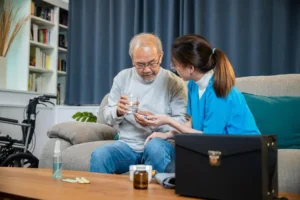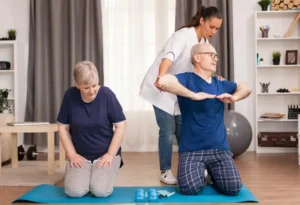“I could never do what you do.”
At least once a day, someone says those words to me. I was raised by a nurse who cared for the elderly and often brought me along to “help.” We lived just a few steps from my grandparents’ front door. Interacting with older people has always been part of my life and has turned into a wonderfully fulfilling career for me. Still, successful relationships with older people can be challenging. Even though not everyone wants to make a career of working with the elderly, most everyone DOES need to know some basics about how to effectively interact and build a relationship with an older person. Here are my top 5 tips for developing positive relationships with the elderly:
1) Smiles mean the same thing to every generation. Older people are magnetically drawn to a friendly smile. Greeting an elderly person with a genuine smile will start your interaction off positively, helping him or her relax with you. (Note: A smile can still be genuine even if you aren’t having a great day. Making an effort to set aside your worries and share a smile with someone will make you both feel better.)
2) Relax about repetition. Older people like to repeat stories. In ancient times, stories shared by parents and grandparents were repeated and even memorized. This tradition preserved the culture of entire civilizations. We as humans have a need to share our experiences with future generations and that need grows in intensity as we age. Learn to see those repeated stories as your elderly loved one’s attempt to share his life with you. There are also the repetitions due to lack of memory. Those with memory loss can set world records in repetition! Listening to a story, even for the fiftieth time, communicates “I care about you. I am interested in you. I love you.” Yes, it sure can be difficult to listen… AGAIN. Vary your responses, ask a different question, and if you’re getting exasperated, change the subject to another happy topic at your first opportunity.
3) Forget about rushing. We once had a volunteer helping residents load onto the St. Francis Villa bus. He exclaimed “This is like herding turtles!” Hurrying isn’t an option for most elderly people. Yes, they’ve often learned the wisdom in “stopping and smelling the roses,” but more often they’re slow by no choice of their own. When you get ready to call or visit an elderly loved one, determine not to rush. Even if you only have 15 minutes to spend, decide to spend 15 unhurried minutes and be realistic about what you can accomplish in the time you have. You’ll have more patience and you’ll honor the elderly person by not asking something of her (such as quickness) that she may be unable to give.
4) Remember that old people are people too. I was brought up to revere and respect older people. I saw my grandmother as a hero, a teacher, a larger than life example. The quintessential southern belle, she wasn’t one to “lose her cool.” I never dreamed she had the same feelings I might have. When I started working with old people I realized that they have the same emotions, fears, and insecurities that are part of the human experience. I also realized they are dealing with weighty issues such as illness, pain, and end-of-life decisions… enough to stress anyone out! I’ve learned to give an older person the grace I’d need myself, knowing she also experiences the same stress.
5) When frustrating behavior happens, remember there may be a deeper cause. Often an older person will nag, complain, manipulate or obsess. He or she may be grumpy or unwilling to participate in special plans, or may seem ungrateful. We all have our bad days. However, I’ve observed that most times an older person is experiencing some kind of pain which surfaces in the form of less-than-ideal behavior. She may be in chronic physical pain. Pain might also be of an emotional nature as she grieves the losses involved in the aging process. An elderly person has often lost the ability to do favorite activities, the ability to “call the shots” over her own life, the ability to remember as sharply or hear as well as she used to, not to mention the loss of friends as her peers age and experience their own physical decline. She may be afraid of a diagnosis or simply worried about her children as any mother tends to do. You may be able to help alleviate her pain, or you may not. Either way, it helps to have an understanding that bad behavior is more often a reaction to some kind of discomfort than it is a personal attack against those trying to care for an older person.
Without a doubt, the benefits of relationship with an older person far outweigh the challenges. When people say “I could never do what you do.” I often tell them how our residents have done way more for me than I have for them. Many many days, an elderly person has lifted my spirits, known just what to say, or given me a reason to keep going. Take some time today to invest in your relationships with the old people in your life.


